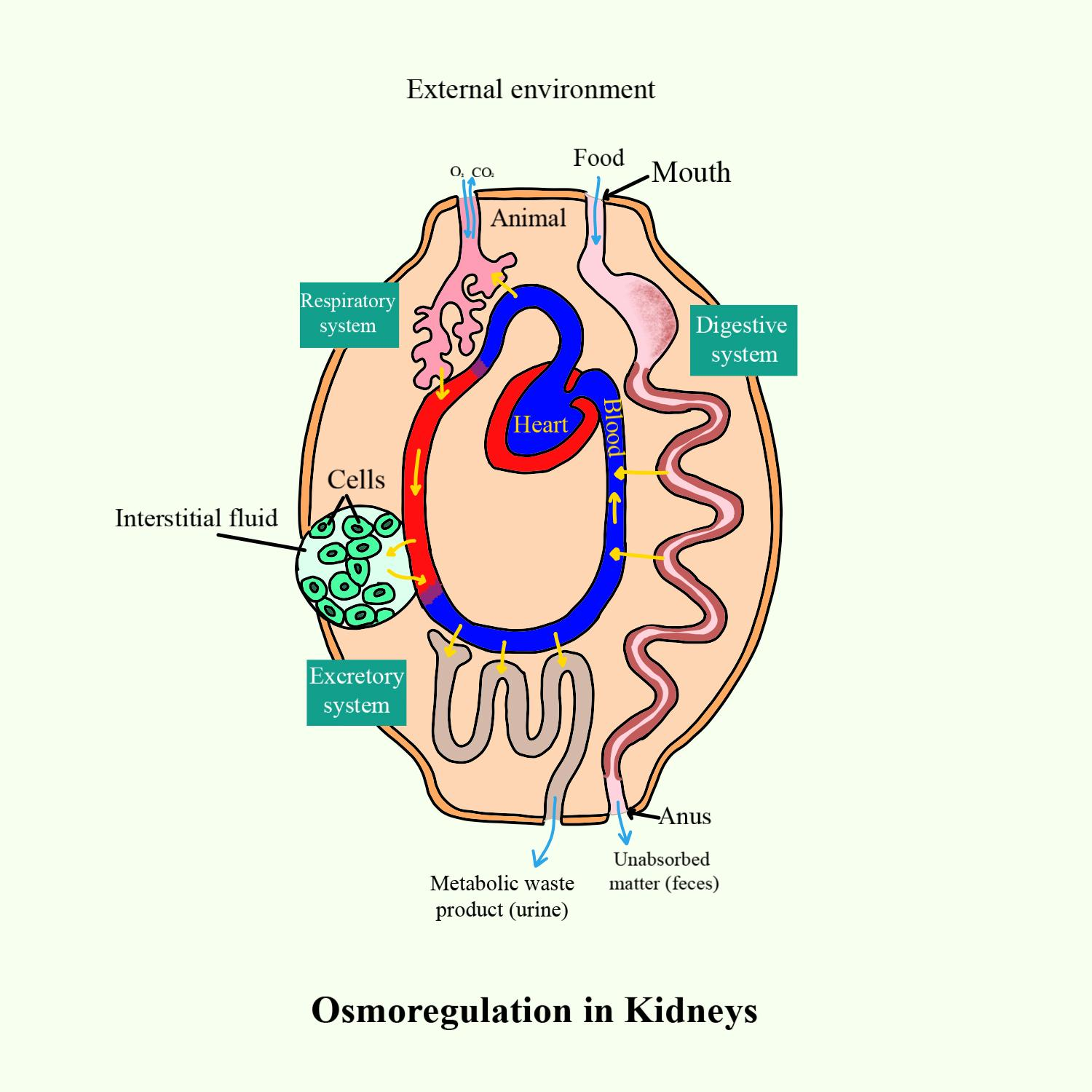
Describe how the kidneys help in osmoregulation in humans.
Answer
566.4k+ views
Hint The maintenance of salt and water balance for the osmotic balance across the membranes inside the body's fluids which constitutes water and electrolytes with nonelectrolytes is known as osmoregulation.
Complete answer:
Osmoregulation involved the concentration and osmotic pressure of blood by regulating the water contents inside the blood plasma. Kidneys excrete a huge amount of hypotonic urine when the water intake is high and excrete a small amount of hypertonic urine when the water is deficient and which needs to be conserved. The osmotic pressure decreases with the excessive water in body fluids which increases the blood volume and signals the posterior pituitary for resisting the production of vasopressin that results in decrease resorption of water by the distal convoluted tubules and the collecting duct. The antidiuretic hormone is produced with the deficiency of water by the posterior pituitary which increases the absorption of tubules of water and causes constriction of blood vessels by increasing the blood pressure and glomerular blood flow by increasing the filtration rate. The kidney constitutes over 1 million nephrons which are an extensive network of capillaries and blood vessels.
Additional information:
The kidneys a specialized organ that plays an important role in homeostasis and maintains that by regulating water, balance blood composition, waste removal, and pressure. They prevent the buildup of toxic products in the body and regulate the chemical components of the body's fluids by responding to certain imbalances of body fluids. It includes the movement of solutes between the internal and external environment which is normally through a transporting epithelium and forms a tubular channel which gives the kidney a large surface area.

Note: The pair of the kidney is lopsided. People can live with one kidney as each kidney consists of 1.5 million. The filtering unit of the kidney is known as nephrons, which removes the waste product known as urea from the blood. An average human needs a minimum of three hundred thousand nephrons to filter blood properly with which one kidney is more than enough to fulfil the purpose.
Complete answer:
Osmoregulation involved the concentration and osmotic pressure of blood by regulating the water contents inside the blood plasma. Kidneys excrete a huge amount of hypotonic urine when the water intake is high and excrete a small amount of hypertonic urine when the water is deficient and which needs to be conserved. The osmotic pressure decreases with the excessive water in body fluids which increases the blood volume and signals the posterior pituitary for resisting the production of vasopressin that results in decrease resorption of water by the distal convoluted tubules and the collecting duct. The antidiuretic hormone is produced with the deficiency of water by the posterior pituitary which increases the absorption of tubules of water and causes constriction of blood vessels by increasing the blood pressure and glomerular blood flow by increasing the filtration rate. The kidney constitutes over 1 million nephrons which are an extensive network of capillaries and blood vessels.
Additional information:
The kidneys a specialized organ that plays an important role in homeostasis and maintains that by regulating water, balance blood composition, waste removal, and pressure. They prevent the buildup of toxic products in the body and regulate the chemical components of the body's fluids by responding to certain imbalances of body fluids. It includes the movement of solutes between the internal and external environment which is normally through a transporting epithelium and forms a tubular channel which gives the kidney a large surface area.

Note: The pair of the kidney is lopsided. People can live with one kidney as each kidney consists of 1.5 million. The filtering unit of the kidney is known as nephrons, which removes the waste product known as urea from the blood. An average human needs a minimum of three hundred thousand nephrons to filter blood properly with which one kidney is more than enough to fulfil the purpose.
Recently Updated Pages
Master Class 11 Computer Science: Engaging Questions & Answers for Success

Master Class 11 Business Studies: Engaging Questions & Answers for Success

Master Class 11 Economics: Engaging Questions & Answers for Success

Master Class 11 English: Engaging Questions & Answers for Success

Master Class 11 Maths: Engaging Questions & Answers for Success

Master Class 11 Biology: Engaging Questions & Answers for Success

Trending doubts
One Metric ton is equal to kg A 10000 B 1000 C 100 class 11 physics CBSE

There are 720 permutations of the digits 1 2 3 4 5 class 11 maths CBSE

Discuss the various forms of bacteria class 11 biology CBSE

Draw a diagram of a plant cell and label at least eight class 11 biology CBSE

State the laws of reflection of light

Explain zero factorial class 11 maths CBSE




